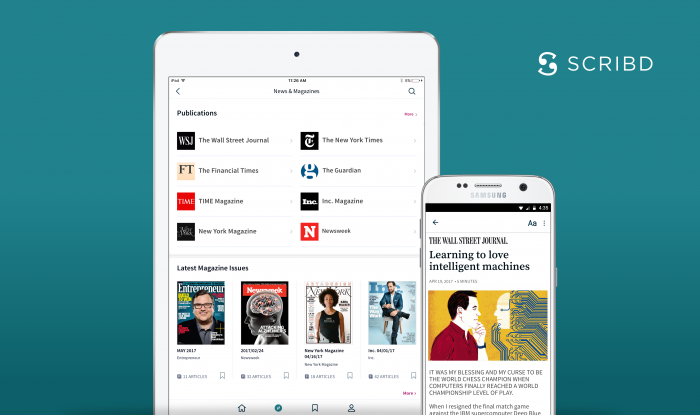
Scribd’s $8.99/month subscription service started out with only ebooks. Over time, it’s expanded to audiobooks, sheet music, documents, magazines — and, as of Tuesday, newspapers. “Select articles” from The New York Times, The Wall Street Journal, and The Guardian, as well as some archival content from the Financial Times, will now be available to Scribd subscribers.
And Scribd says there are quite a lot of subscribers: The service now has over half a million paying subscribers, paying $8.99 a month, and the company is profitable. I was so surprised by the subscriber number that I asked CEO Trip Adler to repeat himself; it’s true, he said: “We have a $50 million revenue run rate.” The San Francisco–based company now has more than 110 employees.
Newspaper content was a “natural addition” for Scribd, Adler said. The most popular forms of the content on the service are, in order, ebooks, audiobooks, and documents. Magazines were added last fall. Scribd used to also include comic books and graphic novels in its service, but stopped including them because there wasn’t enough reader interest. It also switched from a completely unlimited content model to one that offers access to three ebooks and one audiobook per month. (Documents, magazines, and newspapers are unlimited.) Judging by Scribd’s stated membership numbers, the switch in business model appears to have worked. The numbers seem impressive and are not something that I would have predicted a couple years ago when the ebook subscription site Oyster shut down — especially considering that Amazon keeps adding more reading offerings to Prime.Scribd won’t be focusing on breaking news from the papers it partners with. Instead, it’s looking for longer, more evergreen content that “fits in with a book kind of experience,” Adler said. “We’re going for the longer-form content that might actually take a few minutes to read, has a longer shelf life, and will be interesting beyond the first day it comes out.” The newspaper content — along with Scribd’s other content — is organized by interest.
Each of the newspapers is making a fixed number of articles available to Scribd; Scribd editors choose which ones to include on the service. Some of the publishers are being paid a flat licensing fee; others are paid by the read.
“People have been talking for a long time about how to monetize journalism and we think we’ve come up with a really interesting answer,” Adler said. The newspapers included for now are the big names that aren’t having as much trouble monetizing as smaller papers, but Scribd may include more papers in the future. “We think, if we can offer all these different newspapers together for one subscription price, we can return more money to journalists that way.”